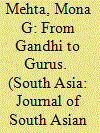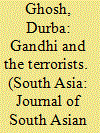| Srl | Item |
| 1 |
ID:
154551


|
|
|
|
|
| Summary/Abstract |
This article compares the public sphere of gurus (‘guru-sphere’) in contemporary Gujarat and that of Gandhi historically as important sites of political contestation. It argues that despite their common use of religious idioms to convey political ideas, Gandhi and the gurus authorise radically different political projects with divergent conceptions of the Hindu subject and Indian polity. The discursive activities of the guru-sphere have helped forge a dominant consensus that endorses Hindutva politics. Operating within a democratic civil society and borrowing from Gandhian idioms, gurus have actively challenged key constitutional values derived from the Gandhian public sphere. The study reveals the paradoxical tendency of Gujarat's public sphere to produce hegemonic monologues over pluralistic dialogues, not in the absence of, but through the institutional mechanisms of, deliberative democracy.
|
|
|
|
|
|
|
|
|
|
|
|
|
|
|
|
| 2 |
ID:
147201


|
|
|
|
|
| Summary/Abstract |
Known for his advocacy of non-violence as a political strategy, this essay examines Gandhi's prolonged debates with revolutionary terrorists about the efficacy of non-violence. Over the course of three decades, Gandhi attempted to bridge the divide between non-violence and violent resistance, and recognised those who espoused political violence as embodying a shared sense of sacrifice and suffering; those who were jailed or detained for their crimes actively debated these strategies with him, even if they did not wholly agree about the efficacy of non-violence. The first two sections focus on Gandhi's engagements with the lives of two revolutionary terrorists who died as a result of their actions, Madanlal Dhingra and Gopinath Saha. The final section examines how two women revolutionary terrorists, Bina Das and Kamala Dasgupta, engaged with Gandhi and eventually joined his non-violent movement.
|
|
|
|
|
|
|
|
|
|
|
|
|
|
|
|